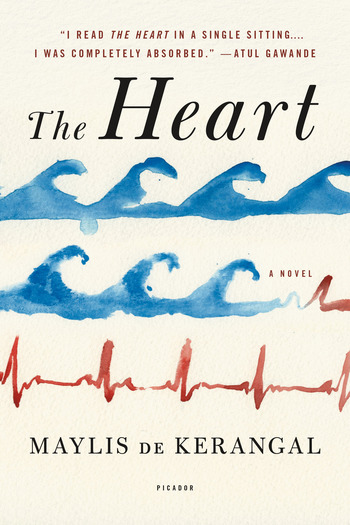
Under the craft of a skilled writer, even the most straightforward story idea can breathe poetry. Such is the case in de Kerangal’s The Heart, originally published in French under the title Réparer les vivants (literally translated as “mend the living”). From the first line, Simon Limbres is introduced, or at least his heart is, both figuratively and literally, prefacing the idea that our flesh is somehow inextricably connected to our memories and our being.
This heart, which made him jump, vomit, grow, dance lightly like a feather or weigh heavy as a stone, which made him dizzy with exhilaration and made him melt with love, which filtered, recorded, archived—the black box of a twenty-year-old body…
This human heart is the singular focus of the narrative, yet it’s also a mechanism used to introduce a cascade of characters with wholly developed identities, histories, and desires. A convergence of individuals whose paths otherwise would not have crossed. While the reader only gets a transitory glimpse of Simon in life, de Kerangal uses the relationships he left behind, as well as the ponderings of the medical professionals his inanimate body will meet, to paint a complete picture of who he was, taking the reader on a sprawling, emotional journey that explores the ethics, procedures, and emotional strain of organ donation from the moment cognition ceases to the heart’s first feeble beats in its new home.
The omniscient third-person narrative provides an intimate view of the many layers involved in organ donation: the family’s rapid cycle through the stages of grief, the spectrum of hospital personalities from the relatable and preoccupied nurse Cordélia Owl to the pompous and god-like doctor Emmanuel Harfang, the inquisitive organ recipient’s discomfort in recognizing that someone’s death has benefited her, and through it all, the transplant nurse Thomas Rémige’s meticulous mediation of the many players.
Rémige is at the heart (pun intended) of de Kerangal’s exploration of identity and body. Through him, we see both an understanding of the symbolic relationship humans have to our bodies as well as the pragmatic view that leaving healthy organs in a departed body is a waste: a waste that deprives others of the chance to live. Rémige simultaneously juggles the spiritual needs of the family, helping them to negotiate past and present and doing his best to provide them with closure; and the pressing timeline of a degrading body that could mean the difference between life and death for multiple patients. While the all-knowing reader knows that he could invoke French law and medical necessity to coerce consent from Simon’s family, he instead approaches them with finesse and with sympathy, seemingly grappling with his own internal dialogue regarding the existential relationship between mind and flesh.
Philosophical questions aside, translator Sam Taylor, a critically acclaimed author in his own right, retained the original French’s precise lexicon and joie de vivre, transforming it into sweepingly ornamental sentences that seem both too raw and too virtuosic to have been conceivably translated from one language to another. While as a lover of words, I was enraptured by the phrasing, I admittedly referred to my dictionary (for “passerine,” “neurasthenic,” zygomatics,” and many more) with greater frequency than any other book has yet demanded of me. The use of italics and colons rather than quotation marks creates a visual stream of consciousness that evokes the urgency of the situation while the boundless sentences that frequently extend beyond a page seem to dare the reader to keep up with its quickly progressing narrative. The frequent time and character shifts, which provide a rounded authenticity to the timeline and character development, seemingly provide the only respite.
The Heart is not for the timid reader; but it is a beautiful reminder of life’s transience. It’s a story of convergence: a convergence of characters, a convergence of science and spirituality, a convergence of our bodies and our minds. A story that will leave you contemplating how our existence remains and is remembered even when our consciousness irreversibly departs.
TLDR: A beautifully written and translated work describing the intimate process of organ transplantation. Highly recommended for lovers of descriptive language or those interested in medicine.
-LB
